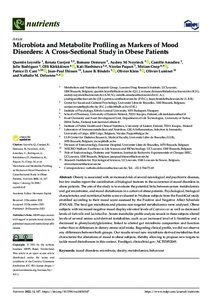Microbiota and Metabolite Profiling as Markers of Mood Disorders: A Cross-Sectional Study in Obese Patients
Leyrolle Quentin; Cserjesi Renata; Demeure Romane; Neyrinck Audrey M.; Amadieu Camille; Rodriguez Julie; Kärkkäinen Olli; Hanhineva Kati; Paquot Nicolas; Cnop Miriam; Cani Patrice D.; Thissen Jean-Paul; Bindels Laure B.; Klein Olivier; Luminet Olivier; Delzenne Nathalie M.
Microbiota and Metabolite Profiling as Markers of Mood Disorders: A Cross-Sectional Study in Obese Patients
Leyrolle Quentin
Cserjesi Renata
Demeure Romane
Neyrinck Audrey M.
Amadieu Camille
Rodriguez Julie
Kärkkäinen Olli
Hanhineva Kati
Paquot Nicolas
Cnop Miriam
Cani Patrice D.
Thissen Jean-Paul
Bindels Laure B.
Klein Olivier
Luminet Olivier
Delzenne Nathalie M.
MDPI
Julkaisun pysyvä osoite on:
https://urn.fi/URN:NBN:fi-fe2022020818046
https://urn.fi/URN:NBN:fi-fe2022020818046
Tiivistelmä
Obesity is associated with an increased risk of several neurological and psychiatric diseases, but few studies report the contribution of biological features in the occurrence of mood disorders in obese patients. The aim of the study is to evaluate the potential links between serum metabolomics and gut microbiome, and mood disturbances in a cohort of obese patients. Psychological, biological characteristics and nutritional habits were evaluated in 94 obese subjects from the Food4Gut study stratified according to their mood score assessed by the Positive and Negative Affect Schedule (PANAS). The fecal gut microbiota and plasma non-targeted metabolomics were analysed. Obese subjects with increased negative mood display elevated levels of Coprococcus as well as decreased levels of Sutterella and Lactobacillus. Serum metabolite profile analysis reveals in these subjects altered levels of several amino acid-derived metabolites, such as an increased level of L-histidine and a decreased in phenylacetylglutamine, linked to altered gut microbiota composition and function rather than to differences in dietary amino acid intake. Regarding clinical profile, we did not observe any differences between both groups. Our results reveal new microbiota-derived metabolites that characterize the alterations of mood in obese subjects, thereby allowing to propose new targets to tackle mood disturbances in this context. Food4gut, clinicaltrial.gov: NCT03852069.
Kokoelmat
- Rinnakkaistallenteet [29335]
